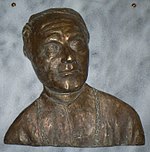Franjo Rački
Franjo Rački | |
|---|---|
| Born | 25 November 1828 Fužine, Kingdom of Croatia, Austrian Empire |
| Died | 13 February 1894 (aged 65) Zagreb, Kingdom of Croatia-Slavonia, Austria-Hungary |
| Occupation | Historian, politician, writer |
| Nationality | Croatian |
| Signature | |
 | |
Franjo Rački (25 November 1828 – 13 February 1894) was a
Biography
Historian
Rački was born in
in 1855.His career as a historian began as soon as he started working as a teacher in Senj. He organized the research of
In 1857, he was moved from Senj to
In Rome, he found many documents on the
Although Rački is more important as a promoter of culture than as a historian, his original historical works are important for their pioneering nature and wealth of information. In addition to his work on the Bogomils, he also wrote Povjesnik Ivan Lučić (The Historian
Politician
In 1860, he returned to Zagreb and founded the People's Party together with his close friend Josip Juraj Strossmayer. Rački was a partisan of the idea of Yugoslavia and fought for Croatian autonomy against Austrian rule. Both he and Strossmayer promoted the cultural and political unity of the South Slavs.[1][2] During the 1860s, he was a member of the Croatian Parliament.[1]
Rački was a prolific political writer. He wrote about all the important Croatia-related topics and issues of his time. He promoted the merging of
Following the Croatian–Hungarian Settlement in 1868 and his party's alliance with the Hungarian government in 1873, he quit politics. He re-emerged in the 1880s, forming the Independent People's Party.[1]
He died in Zagreb on 13 February 1894.[2]
Academy

He started Književnik, the first Croatian scientific magazine for history and linguistics, and Obzor and Vijenac, influential magazines for culture and politics. He was a key founder of the Yugoslavian Academy of Sciences and Arts and greatly contributed to the expansion of the University of Zagreb.[2]
Rački founded most editions of the Academy, which are published even today: Rad, Starine, and the Codex diplomaticus Regni Croatiae, Dalmatiae et Slavoniae, an exceptional monument of legal history. He founded the Academy library, archive and dictionary. His activities determined the work of the Academy for several decades, especially in its cultural and social aspects.[2]
References
- ^ ISBN 9789637326615.
- ^ a b c d e f g h "Franjo Rački". hrt.hr. Croatian Radiotelevision. Archived from the original on 3 April 2014.
- .
External links
- Franjo Rački (in Croatian)
- Život i djela Dra. Franje Račkoga (in Croatian)
